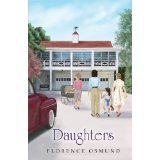An insightful read…
Having just recently finished Daughters by Florence Osmund, I’m happy to say it was a good read – although I must be honest and state that it was a little slow at the start. Daughters is the sequel to Osmund’s previous title: The Coach House. Reading The Coach House prior to reading Daughters is not a prerequisite, but I would highly recommend it so that the reader will have a better understanding of who the various characters are, and how they each came to be where they currently are.
In Daughters, Marie Marchetti is now twenty-four years old, and the year is 1949. Growing up, she never knew who were father was. All she knew was that he provided financial support for her, and Marie’s mother never shared the secret of his identity. After her mother’s passing (still being filled with an insatiable curiosity about her father), Marie became a bit of a detective. With the help of her best-friend Karen, she finally succeeded in locating him. Needless to say, I’m sure you can imagine her surprise when Marie, a ‘white’ woman living in Chicago, discovered that she had a multiracial biological father.
The American world of 1949 was a much different place than it is today. Hate toward (and segregation of) any people of color was prevalent across the majority of the United States. Marie realized that in order to be part of her father’s life, to once more be part of a family, her family, she must deal with the prejudices that come with it. She realized that she would also have to face the prejudices of being multiracial herself.
I don’t want to spoil the story by sharing anything further, but Osmund has once again written a good book with a great message. In fact, Osmund writes so skillfully and knowledgeably about multiracial segregation that one might even wonder if she had experienced it first-hand.
I also want to give praise to Florence Osmund because even though she was writing about a very conflagratory time period and subject, she did it with grace, compassion, love, and understanding. Daughters is a ‘must read’ for anyone who struggles with, or has struggled with, their own identity. While Daughters probably won’t provide specific ‘answers’ it can, if nothing else, reiterate that the reader is not alone in his/her/their struggles.
